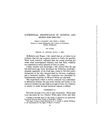 5 citations,
April 2017 in “Dermatologic Surgery”
5 citations,
April 2017 in “Dermatologic Surgery” PRP treatment satisfies 58% of female hair loss patients, with most noticing fuller, thicker hair and less shedding.
 April 2024 in “International journal of clinical trials”
April 2024 in “International journal of clinical trials” SesZen-Bio™ improves hair density, thickness, and overall hair health.
 65 citations,
October 2018 in “Frontiers in cellular and infection microbiology”
65 citations,
October 2018 in “Frontiers in cellular and infection microbiology” Certain bacteria and fungi are linked to healthy scalps and dandruff, suggesting that the scalp's microbial balance affects its health.
53 citations,
March 2003 in “Journal of Investigative Dermatology” Human skin cells have a high-affinity system for biotin transport, crucial for skin health.
 19 citations,
January 2015 in “Current problems in dermatology”
19 citations,
January 2015 in “Current problems in dermatology” Ultraviolet rays damage hair, smoking may cause hair loss, and good nutrition is important for hair health, but genetics mainly decide hair thickness.
 January 2020 in “Asian journal of applied science and technology”
January 2020 in “Asian journal of applied science and technology” Good nutrition is crucial for health and preventing disease, and supplements can help prevent nutrient deficiencies.
 3 citations,
April 2011 in “Expert Review of Dermatology”
3 citations,
April 2011 in “Expert Review of Dermatology” Mesotherapy lacks strong evidence for effectiveness and safety, and its ingredients are not FDA-approved for subcutaneous use.
 145 citations,
November 2017 in “Journal of The European Academy of Dermatology and Venereology”
145 citations,
November 2017 in “Journal of The European Academy of Dermatology and Venereology” Use minoxidil for hair loss treatment; assess results after 6 months.
 33 citations,
August 2018 in “Facial Plastic Surgery Clinics of North America”
33 citations,
August 2018 in “Facial Plastic Surgery Clinics of North America” The document explains hair biology, the causes of hair loss, and reviews various hair loss treatments.
 23 citations,
January 2013 in “Indian Journal of Dermatology, Venereology and Leprology”
23 citations,
January 2013 in “Indian Journal of Dermatology, Venereology and Leprology” FPHL causes hair loss in women due to genetics and hormones; minoxidil and anti-androgens are treatments, and early intervention is advised.
1 citations,
February 2022 in “Journal of the American Academy of Dermatology” Taking biotin supplements can be risky and often lacks evidence of effectiveness for skin, hair, and nail issues.
 5 citations,
December 1942 in “Journal of the American Medical Association”
5 citations,
December 1942 in “Journal of the American Medical Association” Choline and biotin are important for liver health and preventing certain deficiencies in animals, and more research is needed to understand their benefits in humans.
 74 citations,
July 1979 in “Lancet”
74 citations,
July 1979 in “Lancet” Biotin treatment can significantly improve hair loss and motor functions in certain metabolic disorders.
 14 citations,
April 2000 in “Animal Science/Animal science”
14 citations,
April 2000 in “Animal Science/Animal science” Nutrients like vitamins, copper, zinc, and amino acids are crucial for healthy hair and wool growth.
 August 2022 in “Journal of the American Academy of Dermatology”
August 2022 in “Journal of the American Academy of Dermatology” The authors agree they didn't discuss the risks of too much micronutrients and value the focus on biotin deficiency signs and treatment effectiveness.
 June 2023 in “JAAD international”
June 2023 in “JAAD international” Patients with skin of color are more likely to use supplements for hair loss than Caucasian patients, but the effectiveness of these supplements is uncertain and they can be expensive.
 7 citations,
September 2020 in “Journal of Cosmetic Dermatology”
7 citations,
September 2020 in “Journal of Cosmetic Dermatology” Minoxidil and Finasteride are the most popular hair loss treatments, with rising interest in other options, and economic or health crises can change what treatments people prefer.
 36 citations,
June 2019 in “eLife”
36 citations,
June 2019 in “eLife” The study developed a tool to predict how gut microbes process foods and drugs, showing that similar compounds often share metabolic pathways and effects.
 13 citations,
January 2016 in “Journal of cosmetology & trichology”
13 citations,
January 2016 in “Journal of cosmetology & trichology” Alternative treatments show promise for hair growth beyond traditional methods.
 August 2023 in “International journal of research in Ayurveda and pharmacy”
August 2023 in “International journal of research in Ayurveda and pharmacy” Ayurveda can prevent hair fall and promote regrowth using herbs and lifestyle changes.
 February 2024 in “Actas Dermo-Sifiliográficas”
February 2024 in “Actas Dermo-Sifiliográficas” Dermatologists recommend oral dutasteride for male hair loss, low-dose oral minoxidil for female hair loss, and a multidisciplinary approach for young patients, with caution during pregnancy.
 1 citations,
July 2012 in “EFSA Journal”
1 citations,
July 2012 in “EFSA Journal” The combination of certain vitamins and pumpkin seed oil has not been proven to maintain normal hair.
 134 citations,
December 2018 in “Dermatology and Therapy”
134 citations,
December 2018 in “Dermatology and Therapy” Some vitamins and minerals like vitamin D and iron can help with certain types of hair loss, but more research is needed for others.
 4 citations,
March 2006 in “Journal of renal nutrition”
4 citations,
March 2006 in “Journal of renal nutrition” Dialysis patients benefit from water-soluble vitamins but need careful management to avoid risks.
 9 citations,
November 2014 in “Journal of Cutaneous Medicine and Surgery”
9 citations,
November 2014 in “Journal of Cutaneous Medicine and Surgery” Many dermatologists in Saudi Arabia recommend vitamins and minerals for hair loss, often based on personal experience rather than strong evidence.
 December 2010 in “Bariatric Nursing and Surgical Patient Care”
December 2010 in “Bariatric Nursing and Surgical Patient Care” Hair loss after bariatric surgery can be reduced by staying hydrated, eating enough protein, taking vitamins, managing stress, and possibly using biotin.
 1 citations,
November 2011 in “Dermatologica Sinica”
1 citations,
November 2011 in “Dermatologica Sinica” Women using hair relaxers with alopecia had lower zinc levels, suggesting zinc deficiency might contribute to hair loss.
 27 citations,
July 1946 in “The journal of nutrition/The Journal of nutrition”
27 citations,
July 1946 in “The journal of nutrition/The Journal of nutrition” Biotin and inositol are crucial for pig health and growth.
 September 2024 in “Journal of Family Medicine and Primary Care”
September 2024 in “Journal of Family Medicine and Primary Care” Primary health physicians in Saudi Arabia need better guidelines for treating hair loss with vitamins and minerals.
 10 citations,
July 2018 in “Our Dermatology Online”
10 citations,
July 2018 in “Our Dermatology Online” Some vitamins and minerals are important for preventing hair loss, but treating hair loss with them without a known deficiency is not proven effective.




























